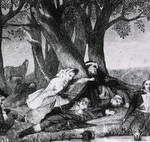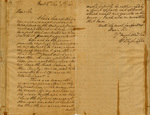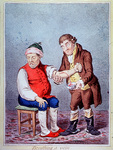Introduction
As head of household, plantation owner, businessman, Revolutionary War general, and president, George Washington had many different concerns and responsibilities, from running his estate to ensuring the stability of a new nation. Alongside the traditional demands of political life and military leadership, he focused considerable attention on the health and safety of his family, staff, slaves, and troops.
Washington’s status and wealth gave him—and his community—special privileges. During his lifetime, with the practice of medicine slowly becoming a licensed profession, he could call on a growing class of experts and new knowledge about the spread and prevention of disease. Even so, Washington, like everyone else of his era, encountered the limits of medicine when faced with serious illnesses.
Learn more about Galter's companion exhibit The State of Medicine at the Start of the Nation.
Events
Lecture by Kelly Wisecup, Assistant Professor of English and American Studies and Science and Human Culture - “Medicine at Home: Early American Botanical Colonization and Native American Herbal Resistance”
Credits
Developed and produced by the National Library of Medicine, National Institutes of Health, and George Washington’s Mount Vernon Estate, Museum & Gardens.
Exhibit Details
Alongside the traditional demands of political life and military leadership, George Washington focused considerable attention on the health and safety of his family, staff, slaves, and troops.
-
- Location
- Library Atrium
- Date
- Nov 21, 2016 - Dec 22, 2016
- Contact
- nlmtravelingexhibits@nih.gov
- Links
- View the online exhibit
- Subjects
- traveling exhibit
- american history
- 18th century



